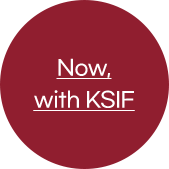
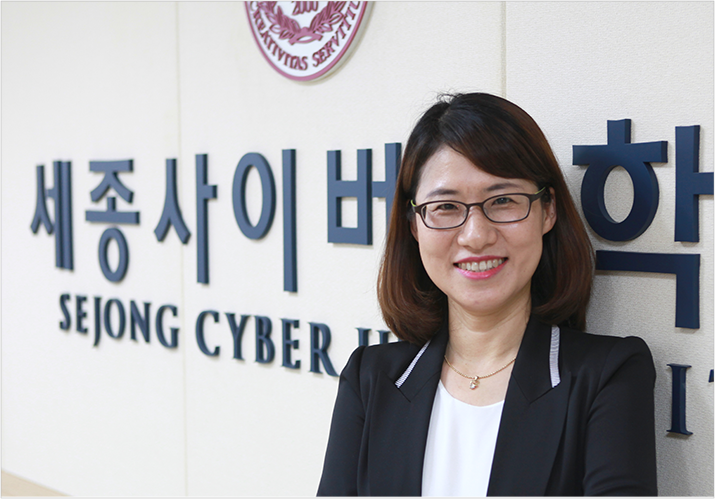
All-Line Korean and Multicultural Education
Specialist: Professor Lee Eun-kyoung of the
Sejong Cyber University Department
of Korean Language
The Sejong Cyber University Department of Korean Language cultivates excellent Korean language teachers through
practical education and diverse field experiences, contributing to the development of global Korean language
education. We spoke with Professor Lee Eun-kyoung of the Sejong Cyber University Department of Korean Language,
who is nurturing All-Line Korean and multicultural education specialists, to hear her thoughts on Korean
language education in this changing era.
Hello, Professor. Thank you for agreeing to this interview. Could you please introduce yourself and the Sejong
Cyber University Department of Korean Language to the readers of ❬Monthly Knock Knock❭?
Hello. I am Professor Lee Eun-kyoung of the Sejong Cyber University Department of Korean Language. I worked as a
Korean language instructor at Yonsei University’s Korean Language Institute for 14 years before being appointed
as a professor when the Department of Korean Language was newly established at Sejong Cyber University in 2015.
I came here to pass on the know-how I acquired through facing challenges and contemplating in the field of
Korean language education with my juniors, and I am currently engaged in nurturing Korean language teachers who
will be active both domestically and internationally. I am very pleased to greet you through the KSIF’s
❬Monthly Knock Knock❭.
The Sejong Cyber University Department of Korean Language aims to “cultivate All-Line Korean language
education and multicultural education specialists who establish expertise with solid fundamentals in the
global era.” We operate specialized curricula (such as TOPIK, AI-utilized teaching methods), certification
programs (Korean language teacher, multicultural society specialist, reading and writing instructor), Korean
language education practice through our own Korean language education institutions and clubs, overseas Korean
language education volunteer work and cultural exploration, and various curricular and extracurricular
activities to develop Korean language education competencies that can be active online, offline, and further
in metaverse environments.
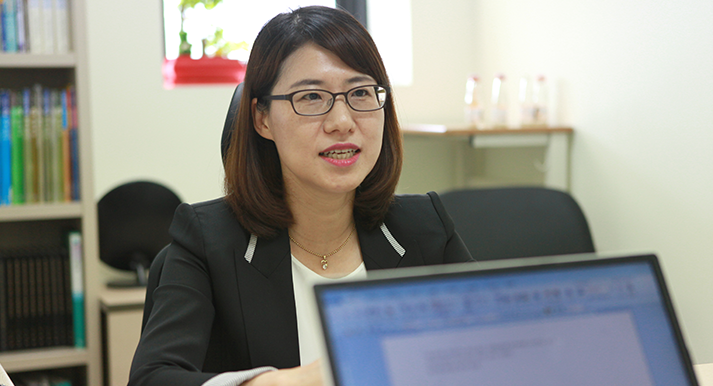 Professor Lee Eun-kyoung of the Sejong Cyber University Department of Korean Language
Professor Lee Eun-kyoung of the Sejong Cyber University Department of Korean Language
The Sejong Cyber University Department of Korean Language places a strong emphasis on practical experience in
training Korean language teachers. Could you share your educational philosophy and the direction of the
department’s operation?
One of the most common remarks made by students who enter the Department of Korean Language is, “I have been
speaking Korean my whole life, but teaching it is incredibly difficult.” Knowing a language and teaching it are
entirely different domains. That is why our department strives to provide as many opportunities as possible for
students to see, feel, and experience Korean language education firsthand.
First, we offer a variety of special lectures where students can hear real-life experiences from experts in the
field. These lectures cover topics such as establishing a Korean language education center, teaching Korean to
adolescents from immigrant backgrounds, experiences working with the Korea International Cooperation Agency
(KOICA) and the KSI, teaching Hangul letters and phonetics, and methods for instructing students for the Test of
Proficiency in Korean (TOPIK). These sessions provide students with practical insights into career paths and
teaching methodologies they are curious about.
Second, we provide students with opportunities to visit overseas Korean language education sites and gain
hands-on experience in teaching Korean language and culture. To date, we have conducted such programs in
Vietnam, China, Laos, Mongolia, and the Philippines, where students immerse themselves in local cultures and
engage with learners through Korean language and cultural exchange.
Third, we offer students the chance to build teaching experience even while they are still enrolled. Nowadays,
even volunteer positions in Korean language education often require prior teaching experience. To address this,
we provide both current students and graduates with opportunities to participate in Korean language education
volunteer work through our university-operated Korean language education center and student clubs. This allows
them to gain official recognition for their teaching experience.
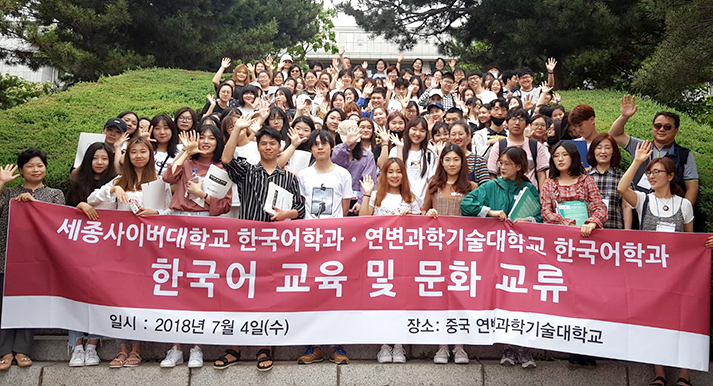 Scenes from the Sejong Cyber University Department of Korean Language’s Overseas
Scenes from the Sejong Cyber University Department of Korean Language’s Overseas
Korean Language Education
Site Visits
Recently, Korean language education for foreigners has been expanding not only overseas but also within Korea.
As interest in the Korean language and culture continues to grow, how do you see the future direction of
Korean language education?
Korean language education is heavily influenced by Korea’s economic and political standing. Recently, the global
popularity of K-culture has led to increased interest in all aspects of Korean culture, including music, film,
food, and fashion. Additionally, more people are coming to Korea for higher education, employment, and marriage.
As a result, the nationalities of Korean language learners and their reasons for learning Korean have become
increasingly diverse.
Therefore, Korean language education can no longer be limited to language instruction alone. Korean must now be
taught in conjunction with various cultural phenomena. In addition to traditional culture and artistic works,
incorporating elements such as lifestyle, social values, and generational perspectives will enable learners to
use the language in a more practical and realistic manner.
We are now in a period of transition from a standardized curriculum to personalized learning paths tailored to
individual needs and goals. Increasingly, learners are opting to study Korean one-on-one through apps and
language exchange platforms rather than at Korean language education centers or multicultural centers. It is
crucial to provide these learners with study materials suited to their interests and objectives so they can
develop the specific Korean language skills they need. Accordingly, future research in Korean language education
will also become more individualized and diverse. Keeping pace with these changes, it is important for
government institutions, schools, and individuals to collaborate—sharing teaching methods and resources,
communicating effectively, and finding ways to coexist and thrive together.
The methods of delivering Korean language education in online environments are becoming increasingly diverse.
What do you see as the strengths of online-based Korean language education, and what is needed to utilize it
effectively?
Since the COVID-19 pandemic, there has been rapid progress in research on software and teaching methods for
online learning, leading to revolutionary changes in online teaching and learning environments. In the past,
online education was primarily one-directional, relying on VOD lectures. However, real-time interactive
education through platforms such as Zoom, Webex, and Google Classroom has now become widespread. Additionally,
various collaboration and engagement tools like Padlet, Mentimeter, and Kahoot have been developed, allowing
online classes to facilitate communication comparable to, or sometimes even more dynamic than, traditional
offline classes.
These advancements enable educators to connect more easily with learners from around the world while also
providing learners with more immersive learning experiences. However, this also means that Korean language
teachers must enhance their teaching capabilities. Rather than sticking to traditional methods, educators must
actively seek and develop teaching materials and utilize a variety of instructional tools to keep pace with the
changing times. To support this, our department offers special lectures on topics such as utilizing ChatGPT and
AI in Korean language education. We have also incorporated related subjects into our curriculum to ensure that
our students are equipped with the necessary skills to effectively teach Korean in digital learning
environments.
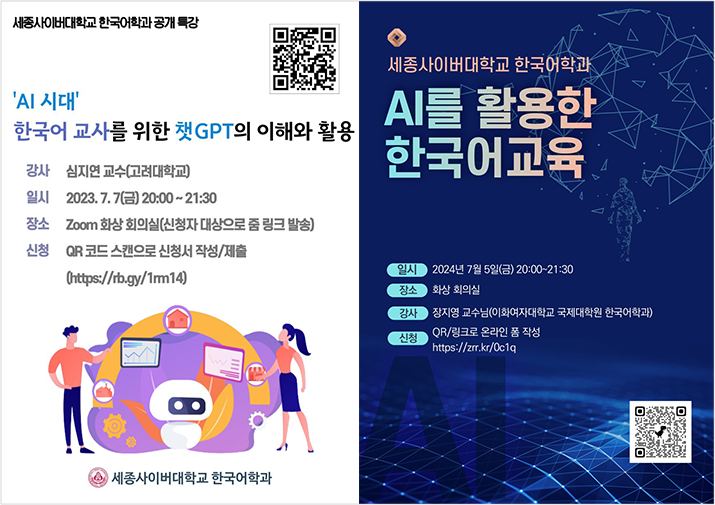 Poster for the Special Lecture on AI and ChatGPT Hosted
Poster for the Special Lecture on AI and ChatGPT Hosted
by the Sejong Cyber University Department of Korean Language
The Sejong Cyber University Department of Korean Language provides scholarships to teachers affiliated with
KSI. What is the significance of this support, and what are your expectations for future collaboration with
KSIF?
Our relationship with KSIF goes back quite a long way. In 2016, we hosted a special lecture on the topic of
“Dispatching Korean Language Teachers Abroad through the KSI.” In 2020, we conducted online Korean language
teaching practice sessions for prospective local Korean language teachers at KSI Center Vietnam. Additionally,
this past January, Kim Jung, the Head of the Education Support Team at KSIF, delivered a lecture titled
“Introduction to Dispatched Teachers at the KSI.” Furthermore, we have established a formal partnership with
KSIF to provide scholarships to its affiliated teachers and staff.
The goals of KSIF and the Sejong Cyber University Department of Korean Language are fundamentally aligned. Both
institutions aim to cultivate excellent Korean language teachers and dispatch them to places where Korean
language education is needed, ultimately contributing to the global expansion of the Korean language. We are
committed not only to training high-quality teachers who can serve at KSI but also to supporting and retraining
local instructors. Many of our students, who have studied using the textbooks and learning materials from Nuri
KSI, are now being dispatched worldwide through the King Sejong Institute. I look forward to continued
collaboration between our two institutions so that we can grow and develop together in the future.
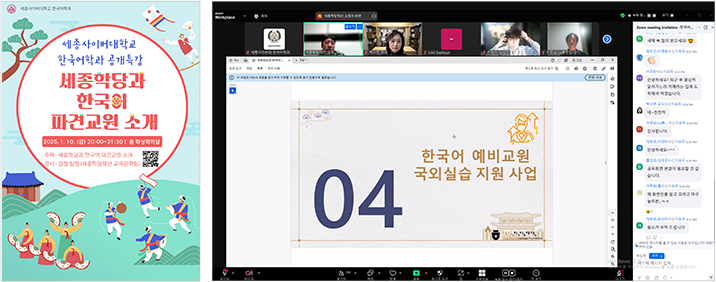 Online Public Lecture on “The KSI and Introduction to Dispatched Korean Language Teachers”
Online Public Lecture on “The KSI and Introduction to Dispatched Korean Language Teachers”
Held in January
2025
Could you introduce any graduates from the Sejong Cyber University Department of Korean Language who are
currently active as teachers at the KSI?
Graduates of the Sejong Cyber University Department of Korean Language are actively working at various KSIs
around the world, including the KSI Abidjan in Côte d'Ivoire, the KSI London in the United Kingdom, the KSI San
Juan in the Philippines, and the KSi Dnipro in Ukraine.
One notable example is Lee Ju-ran, a recently dispatched teacher currently working at the KSI San Juan in the
Philippines. While studying in the Department of Korean Language, she diligently participated in a Korean
language study group and gained experience in online Korean language education through a volunteer club. Thanks
to these efforts, she was dispatched to the Philippines immediately after graduation. Hearing her say that
teaching students brings her immense joy makes us truly grateful to the KSIF for providing such a wonderful
opportunity.
Finally, do you have any advice for aspiring Korean language teachers?
The path to becoming a Korean language teacher is not always stable or easy. With an increasing number of
certified teachers, securing a teaching position is also becoming more competitive. However, this field
continuously presents new opportunities, and few professions offer as much fulfillment through meaningful
encounters and personal growth.
I encourage aspiring teachers not to rush but to steadily build the necessary skills and competencies for the
profession. Take advantage of every opportunity to gain real teaching experience. Instead of simply following
conventional paths, be open to new types of learners and innovative teaching methods. Stay curious about
emerging teaching and learning techniques that align with the changing times, and take the initiative to develop
and refine your skills. I firmly believe that opportunities will come your way to inspire and nurture new dreams
through the Korean language and culture.